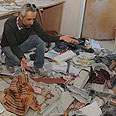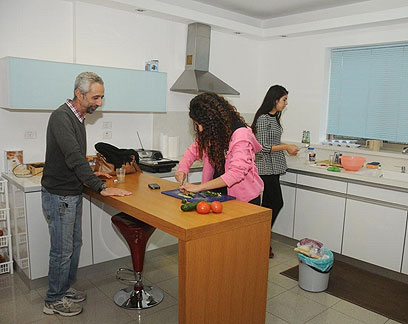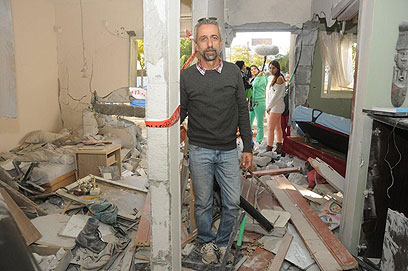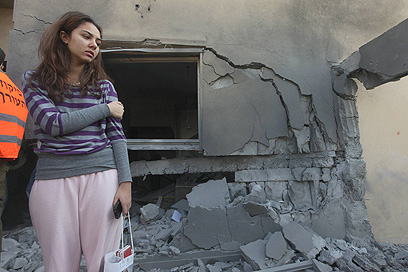

Aharon Hachmon from Beersheba is counting the days. A month after Operation Pillar of Defense ended, Hachmon and other residents of the south whose house were hit in rocket attacks are still unable to return to their homes.
"There's a feeling that the authorities are saying, 'The house is gone, oh well.' It's been over a month and they haven't done anything yet," he says.
On November 21 the ceasefire between Israel and Hamas came into effect. The fighting that claimed the lives of five Israel left others who lost their homes with scars.
Related stories:
- BOI: Economy unaffected by Gaza op
- Gaza op to cost NIS 3B in damages
- Op-ed: Becoming Israeli during Gaza operation
Up until a week ago, the seven members of the Hachmon family slept on mattresses in a rented apartment they got after their house took a direct hit. This week they finally received beds to sleep on.
A Tax Authority contractor examined the family's house to determine whether it will be demolished or restored, but Aharon fears it will be long time before he and his family will be able to return. "My wife is on the rocks and so is my little girl.
"There's a big mess. In the beginning they told me, 'You'll be back home in two months.' I know now it won't be two months, not even three or four.
"We're trying to make do with our temporary house but I don't know what will happen. Right now I'm really cold at home and also in my soul. I'm trying to make the alternative apartment feel like home at least for the family. It's not a good time for us."

Hachmon family in temporary housing (Photo: Herzl Yosef)
Aharon's daughter Lotem, 18, is also despondent. "It's like the knife went in and now someone is twisting it," she says. "Nothing is moving. Now we have to deal with the new house, and up until a few days ago we slept on mattresses. I also need to catch up on school. I'm constantly finding out that I'm behind on something new.
"I don't feel we’re getting the help we need. It's a dark tunnel we're walking in for the past month and three days and can't see the light at the end."
The temporary apartment keeps a roof over their heads, but Lotem says it's not enough. "For a whole month, we slept on mattresses. You don't feel at home. For the first two weeks after the rocket landed I was hardly at school. I can't really sleep and wake up tired in the morning. Now I have the matriculation exams to worry about. I came to the state where I didn't have a coat for the winter, but let that be my biggest problem."

Aharon Hachmon in damaged house (Photo: Herzl Yosef)

Lotem Hachmon. 'We're in a dark tunnel' (Photo: Herzl Yosef)
The Tax Authority said in response, "Half an hour after the missile hit the Hachmon house a Tax Authority team arrived at the house. From that moment on, a representative has been closely accompanying the family.
"At the first stage, the family was moved to a hotel funded by the Tax Authority and it now resides in temporary housing also funded by the Tax Authority. The family has also been given an advance to finance immediate expenses."
It was further stated, "As for the structure, as it is a complex restoration, it naturally requires comprehensive examination and planning which both take time. It should be noted that the issue of refurbishment is being examined by an engineer on behalf of the Tax Authority in cooperation with an engineer on behalf of the Hachmon family. As of now, they have agreed on several points."
'Our world is collapsing on us'
The Cordorveros family was also forced to deal with alternative housing after their Netivot house sustained a direct rocket hit. As a temporary solution the family was moved into a fully furnished villa not far from their original home.
"We have yet to receive an estimate of the damages sustained to the structure or for the property damaged," said Regien, the mother, who works in a construction company and is therefore well informed in costs.
Accorder to her, "The prices given by property tax officials are not realistic in today's market. I am not willing to compromise. My brother was killed in a car accident before the operation. When the rocket fell I was in a different place. Slowly I am recovering, and I see that there is no house, no shower, and no basic essentials. Our entire world is collapsing before my children's eyes."
Regein adds that "On TV they said 'don't worry, we will reimburse you for everything,' hence I just can't understand it. I hope we do not get stuck, because right now we are not getting anywhere. Don’t get me wrong, the property tax people are very nice, but they keep telling us that there are many people like us, that the system is overwhelmed, that we are not the only ones and that there are worse cases. But the bottom line is that I have not reached the point were I can involve a contractor to begin work."
Those physically wounded are also having a hard time getting over the trauma of the rockets. Among those is David Rahamim, 57, from Ashkelon who was wounded in his leg a day before the ceasefire came into effect.
Rahamim, a father of four, was seriously wounded by a rocket that landed in the city, and as a result has had his leg amputated. After initial treatment he began the process of rehabilitation and is currently receiving treatment in the Sheba medical center in Tel HaShomer.
"I was driving to a friend in my car," he recalls. "A siren caught me just a block away from my house. I pulled over and ran to find shelter, but the rocket fell seven meters from me. I saw the rocket hit the ground and explode, and then I remember feeling a heavy blow to my leg. I couldn’t stand; I lost my balance and fell to the ground. One of the people came to my aid and applied a tourniquet to my leg until the ambulance arrived and took me to the Barzilai Medical Center where I underwent two surgeries."
'I don't want a free pass'
Before the operation Rahamim worked as an independent bulldozer driver and was the family's sole breadwinner. Today he has a clearly stated goal - to return to work. "I am trying to push away the bad thoughts," he says. "I am trying to look to the future and get over the past.
"I don’t want a free pass; I just want to return to doing 90% of what I was able to do before the injury. I am doubtful that I will be able to return to my previous job as a bulldozer driver, but I am willing to do other things instead. I am not going to sit around and be a burden on anyone."
Several miles south of Ashkelon there is a factory manufacturing chemical compounds for the plastics industry. The factory was hit by two rockets during Operation Pillar of Defense and sustained severe damage. "Gladly no one was hurt, but the factory could not deliver goods for six days and this has cost us several millions of shekels," manager Nadav Goldstein said.
He added that the factory resumed full operations on the day the ceasefire came into effect. "It took us five days to resume operations because the factory did not have power and the Home Front Command refused to allow us to repair the transformer.
"For us, any box that got the smallest shrapnel is damaged. Entire teams have been working on the materials for the past month and should be acknowledged for that. We are happy that there is calm but in this crazy region you never know."
Neri Brenner contributed to this report
- Receive Ynetnews updates
directly to your desktop















